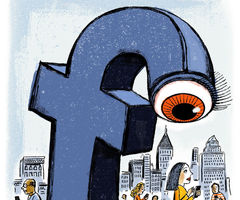MI SELECCIÓN DE NOTICIAS
Noticias personalizadas, de acuerdo a sus temas de interés

Mark Zuckerberg has outlined a new vision for Facebook Inc. that he says is focused on privacy. It is a major shift in direction, but it doesn’t mean what you think it means.
What the Facebook chief executive’s manifesto really promises is a more tightly integrated version of Facebook’s various apps and services, cloaked in the raiments of privacy but, in fact, continuing to operate in contradiction to it. Facebook would still gather data from its existing sources-the core social network, its Instagram app, an web-wide tracking system and countless apps that sometimes send the company deeply personal information-but also increasingly from messaging apps. These would double as interfaces with businesses and, eventually, usurp the functions of our credit cards and digital wallets. (He mentioned “payments” in his note four times.)
Mr. Zuckerberg understood long before most of us did that the public sharing that made his business so successful was a fad. The price he paid for WhatsApp-$22 billion-seemed like a multiple-zero typo, but now it is considered a prescient investment.
Recent data from Edison Research suggest Facebook’s primary social network has lost an estimated 15 million users since 2017 in the U.S. alone. Most of those are in the coveted 12-to-34-year-old demographic. Yet Facebook’s most recent quarterly report shows a company at the apex of its power, earning record profits and growing its overall user base as people shift to Instagram and WhatsApp. It’s clear Facebook must follow its users to the services they are turning to as alternatives to its flagship, and there can be no doubt that internal numbers, some of which Mr. Zuckerberg referenced, show people devoting more time to messaging, small groups and ephemeral posts like Instagram stories.
WhatsApp was Facebook’s quick access into a world that has two dominant players occupying very different spheres: Tencent ’s WeChat and Apple ’s iMessage. WeChat has become a de facto operating system for life in China. While it doesn’t have the encryption features that Mr. Zuckerberg described, it has all of the revenue-generating services that he covets.
Apple’s messaging app truly is an app, with its own end-to-end encryption and a growing roster of built-in services, from payments to stickers. Because it’s the default way to send messages on the iPhone, it has devoted users who seem to have no qualms about their time inside Apple’s walled garden.
The animus between Apple CEO Tim Cook and Mr. Zuckerberg is no secret. Mr. Cook has often called out Facebook for its privacy scandals, and cast Apple as a privacy-protecting alternative. Belatedly, Mr. Zuckerberg seems to have realized that the reputational damage of the Cambridge Analytica data breach and a half-dozen scandals since could affect his company’s bottom line.
The data-hungry advertising business that Facebook has built up over the years will have to adapt to this new direction, but continuing to divine our intents probably won’t be as great a challenge as it might seem. The company doesn’t need to know what we’re messaging each other. Mr. Zuckerberg says Facebook doesn’t use message content to target ads, just as Google doesn’t scan the contents of Gmail messages to serve ads.
Facebook will be able to target us with uncanny precision even without access to our messages.
In his manifesto, Mr. Zuckerberg wrote, “It also makes sense to limit the amount of time we store messaging metadata. An important part of the solution is to collect less personal data in the first place.” These are moves in the right direction, but they amount to streamlining the data operation, not extinguishing it. It’s clear his company intends to continue to advertise to us, even on its encrypted platforms.
Mr. Zuckerberg said as much in at least one of his post-manifesto interviews, with Wired’s Nicholas Thompson. Knowing where we are, who and what we connect to and when we do it wouldn’t fall under Facebook’s proposed broader encryption. That metadata is more than enough to characterize us to a breathtaking degree, say academics and engineers who practice “social physics” and “people analytics.”
Mr. Zuckerberg said he has no plans to eliminate or even change Facebook’s News Feed or stories in Instagram, Facebook’s groups or any other part of what he calls Facebook’s public square. He’s effectively taking all that is already problematic about Facebook and growing the messaging layer, using the privacy angle as a selling point for his expanded platform. He did, however, note that “significant thought needs to go into all of the services we build on top of that [privacy] foundation.”
That Facebook wants to make it possible for dissidents to use its services to communicate securely is admirable, but must be weighed against the fact that this will put even more of the communications on Facebook beyond the reach of the company’s own content filters. Pivoting to privacy is a neat judo move for Facebook, as the company’s former chief security officer Alex Stamosobserved on Twitter. It allows the company to absolve itself of responsibility for the content that passes through its systems, while also allowing it to claim a victory for individual freedom.
Nothing in Mr. Zuckerberg’s manifesto or subsequent statements question the fundamental premise of Facebook’s business, which is gathering more data about us in order to reach us with more-targeted and effective advertising.
Facebook is rushing to meet users where they want to be-communicating individually and in small groups-without altering the trade-off the company has always offered: our privacy for its services.
La orden de Menéndez permitirá al Servicio de Inmigración y Control de Aduanas y a otras agencias mantener a 3.000 agentes desplegados
Peso mexicano sigue apreciándose, pero depende de lo que pase con dólar y próximos datos económicos de México y EE. UU.